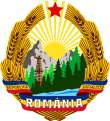
Summary
"Pe-al nostru steag e scris Unire" (transl. "Unity is written on our flag") is a Romanian patriotic song dedicated to the United Principalities of Moldavia and Wallachia established in 1859. The text was written by Andrei Bârseanu and the music was composed by Ciprian Porumbescu in 1880. Its tune is now used in the Albanian national anthem[2] and allegedly in the anthem of the Dutch city of Maastricht.[3]
| English: Unity is written on our flag | |
|---|---|
 | |
Former national anthem of Socialist Republic of Romania | |
| Lyrics | Andrei Bârseanu, 1880 |
| Music | Ciprian Porumbescu, 1880 |
| Adopted | 1975 |
| Relinquished | 1977 |
| Audio sample | |
E scris pe tricolor Unire
| |
The song was an official anthem for the Party of the Nation, established in June 1940 by King Carol II as the basis for his authoritarian regime.[4] In 1975, after a national contest for a new anthem, Nicolae Ceaușescu made this song the national anthem of the Socialist Republic of Romania with lyrics modified by the Romanian Communist Party (PCR) to reference communism and title changed to "E scris pe tricolor Unire". However, since Albania already used the song since 1912, "Trei culori" ("Three colors") was adopted in 1977.[1]
On 28 January 2016, Romanian journalist George Roca published an article stating that the anthem of the Dutch city of Maastricht had been copied from "Pe-al nostru steag e scris Unire". Mestreechs Volksleed, adopted in 2002, had a great similarity to the Romanian song, so Roca compared both songs and the Albanian anthem. He said that, unlike the Albanians which were proud of the Romanian origin of their anthem, the Dutch "stole" the hymn even though they blocked Romania from entering the Schengen Area for corruption claims.[5] The controversy had a great impact on Romanian media, where news began to spread in several newspapers, as well as in Wikipedia. Months later, Roca declared satisfaction after seeing the effect that his article had had.[6] Some residents of Maastricht have said this is just a coincidence and an article in the newspaper De Limburger explained that Mestreechs Volksleed originated from the closing song to the 1912 Dutch opera Trijn de Begijn, made by Alphonse Olterdissen (lyrics) and Guus Olterdissen (melody). It was also said that Olterdissen was unlikely to have been inspired by Romanian songs, as he used to use more nearby German and French ones. The similarities between the two songs have sparked fights on the Internet in which Romanians accuse Dutch people of having "stolen" the song even when Albanians "had the decency" of asking for it, while Dutch people reject these claims.[3]
Lyrics edit
Original lyrics (1880) edit
Pe-al nostru steag e scris unire, |
On our flag is written unity, |
Lyrics modified by the PCR edit
Nicolae Ceaușescu made the lyrics of this song the national anthem of Romania, but since Albania already used it, it was replaced in 1977.[1]
The modified lyrics were the following:
E scris pe tricolor unire |
Unity is written on the tricolour |
Notes edit
References edit
- ^ a b c Petru Bălan, Cristian (2008). Imnurile de stat ale țărilor din Uniunea Europeană (in Romanian). Cristian Balan. p. 112. ISBN 978-9737400949.
- ^ "Himni kombëtar". 2009-10-26. Archived from the original on 2009-10-26. Retrieved 2019-10-07.
- ^ a b Banach, Benti (19 July 2019). "Komt het Maastrichtse volkslied uit Roemenië?". De Limburger (in Dutch).
- ^ Gheorghe Stoica, "Agârbiceanu la Tribuna – Cluj. 1938–1940", in Tribuna Documenta, Issue 1, 2004, p. VII; Petre Țurlea, Partidul unui rege: Frontul Renașterii Naționale, pp. 156, 280. Bucharest: Editura Enciclopedică, 2006. ISBN 973-45-0543-2
- ^ Roca, George (28 January 2016). "Pe-al vostru steag e scris Unire!?". Gândacul de Colorado (in Romanian).
- ^ Roca, George (31 July 2016). "O privire sinoptică asupra imnului României". Gândacul de Colorado (in Romanian).
External links edit
- "Pe-al nostru steag e scris Unire" on YouTube


